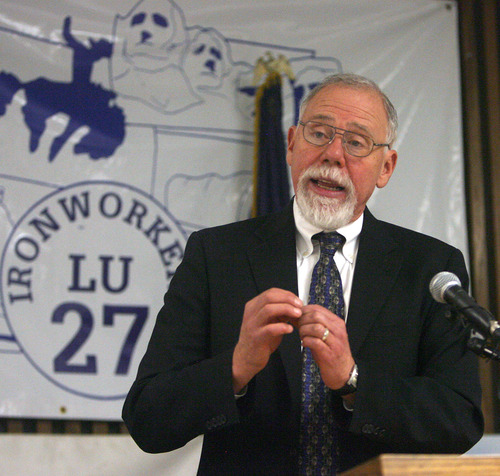This is an archived article that was published on sltrib.com in 2014, and information in the article may be outdated. It is provided only for personal research purposes and may not be reprinted.
Just before the New Year broke, I got myself prepared. Bought a new journal with fresh empty pages to be filled with my observations. I had a serious task ahead, something akin to sociology or cultural observation.
As Gov. Gary Herbert became so alarmed and panicky when gay marriage became legal on Dec. 20, I thought I should be prepared to note the societal changes carried on the coattails of marriage equality.
But with the stay granted by the U.S. Supreme Court, I didn't get to make too many entries. Herbert used persuasive language to halt the machinery of legally recognizing same-sex couples as married. I was alarmed myself when I heard him address the topic with language usually reserved for invasions from Mars or earthquakes registering 9.0, or a tsunami rising from the Great Salt Lake.
Breathless and looking piqued, his eyes revealing the inevitable downward slide of humankind, he spoke of crisis and even used the word emergency in his efforts to cease the rising tide of gay couples swarming county clerk offices.
When the governor employs the term "emergency," I worry. The fact that he is very relaxed in forgoing background checks for purchasing weapons in Utah, not even remotely concerned about placing an AK-47 into the hands of a deranged lunatic, then calling gay marriage "an emergency," catches my attention.
When the governor doesn't raise a fuss about the capital city trying to breathe through the worst air in America, hoping instead for a new weatherman to bring air quality change, then calling gay marriage "an emergency," raises profound concern. Both weapons and toxic air can literally kill us; what unimaginable thing will gay marriage do to us?
These are my notes thus far in my effort to track the pending disaster created by same-sex marriage: Each morning the sun continues to rise and my mail carrier still delivers the bills. Although I noted that my issue of The New Yorker came a day late, he assured me that had nothing to do with gay marriage. He blamed it on a backlog of Christmas stuff. I wondered if he was an activist mail carrier.
Predictions of an incoming storm inspire people to hoard provisions, leaving supermarket shelves bare. I checked several stores, and the shelves were full and the clerks polite and helpful. Gay marriage apparently did not lead to emergency-type hoarding, but it was still a relatively new phenomenon.
I asked two of my heterosexual neighbors if gay marriage was somehow affecting their own marriages. They looked at each quite puzzled. I said, "You know I'm a minister and this will be completely confidential. The governor is concerned about the moral threads of our society unraveling with gay marriage, with the distinct possibility that heterosexual marriages will suffer grievous damage."
"No," they each said. "Our marriage is still the same as usual." Hmm, I thought. Can I trust that?
The school bus still drives past my house at 7:50 a.m. picking up children; restaurants remain open; I see people headed to their houses of worship with smiles, no hint of anything catastrophic lurking in the foreseeable future. I asked a realtor friend if gay marriage might hurt home sales. She didn't think it would.
If the Supreme Court eventually rules against the governor, I want him to know that I continue to remain ready to record any signs of either significant or subtle change in the lives we all lead. I will then forward him my notes and ask if these constitute the precursors to the emergency he fears will break down our perfect lives. And when this is all settled one way or another, I hope that the governor will share with us just what he means by an "emergency."
The Rev. Tom Goldsmith is senior minister at the First Unitarian Church, Salt Lake City.



